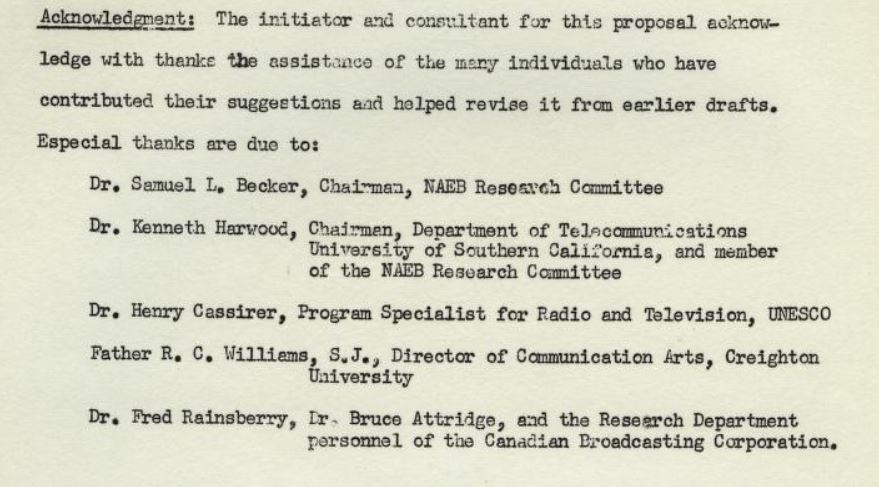A June 19, 1959, letter to Harry Skornia from Sam Becker, the chair of the NAEB research committee, consisted almost entirely of a quoted assessment of McLuhan by “a man who knows McLuhan quite well”. Skornia noted on its head: Essential! — showing that he agreed with the assessment and with its take on McLuhan’s virtues and vices.
It may be that it came from R.C. Williams, SJ, and that it reflected the experience and judgement of the remarkable group of Jesuits1 who studied with McLuhan in the early 1940s in St Louis — Williams (1906-1975) along with Clement McNaspy2 (1915-1995), Walter Ong3 (1912-2003), and Maurice McNamee4 (1909-2007). The assessment calls McLuhan ‘Mac’ and speaks of his “original brilliance” — both pointing to his time at SLU.5 Further, it came from a person long friendly with McLuhan who was a member of the NAEB and a professor of media well aware of McLuhan’s “lack of concern for most of the things we teach in our media courses”. Few beyond Williams might be thought to fit this profile.
I hope you and NAEB know Mac well. He‘s an authentic genius, I’m sure. He is also a poet in temperament, given to insight as a technique of research, and on him it fits well. He sometimes leaves out all the middle steps in stating conclusions, offering only outrageous (at first) generalizations, which anger many people. Remember always that he cares almost only about the intrinsic form of the various media (as an artist) and has only superficial patience (or understanding) of the likes of statistics, financial structure and even content analysis. He believes that form of the media is greater than anything, that print is not film is not radio is not television, etc. But only half a dozen people I know sense the urgency of this idea with him. They speak of the role of the advertiser, [but] Mac says in effect, ‘the nature of the medium as an art form, makes the role of the advertiser nearly incidental, and, besides, the advertiser is, in a sense, a contemporary artist.’ And he means it, no nonsense.
I [agree with]6 this view because I have seen people tire of Mac after an initial love affair, lose faith and conclude that he is an opportunist. He isn’t. He may well be the most important asset the media have, because he believes with a profundity which most of us only mouth that they are the most important factors in the modern world, not because they are propagandistic, but because they determine perceptual processes (not merely content) of people. Print, by its form, creates a way of thinking, not only a store of content; so do all other media. Few people really understand this message.
Then there is this: Mac needs a translator, an assistant or friend or backer if he is to assume an administrative role (…) I advise you most seriously as a friend, and as his good friend, that he has never been able to speak the heart of his message successfully to most professional media men, and he hates detail, skipping all middle steps, as he generally does. He needs people of proper temperament.
I think NAEB has made a daring and fine decision. I ask you and colleagues in NAEB to remember the original brilliance (which still persists) and to be prepared for Mac’s ignorance and lack of concern for most of the things we teach in our media courses. He could learn them, but he doesn’t care to, particularly, for the important thing [for him] is [only the] inherent form of the media, not control structure, content, audience, etc.
When the doubts arise in NAEB, perhaps you can be Mac’s friend and translator. You’re (NAEB) way ahead of your time in doing this. With understanding Mac can perform beyond expectation, which is beyond the thinking of most of us, by far. He can also be frustrated by the shoe clerks among us.
Also, he can be wrong in factual detail that you carry in your hip pockets. Forget it. Rely on his insight.
He’s an artist, a poet — we need them in the media.
In the finalized NAEB funding proposal to the US Office of Education, March 27, 1959, Williams was among the 6 people singled out for special thanks by the initiator (Skornia) and consultant (McLuhan):
- These were men, some older than McLuhan, like Williams and McNamee, with broad training and experience and who were able to give McLuhan as much as they got from him in return. Ong did his MA thesis on Hopkins — McLuhan did a 1944 paper on Hopkins for the Kenyon Review (‘The Analogical Mirrors’). McNamee did his SLU thesis on Francis Bacon — McLuhan included much on Bacon in his 1943 Nashe thesis and wrote and lectured on him extensively in the 1940s. Perhaps Williams with his early interest in television was eventuallly able to contribute even more decisively than his colleagues to McLuhan’s later development with its focus on media. See McLuhan and Father R.C. Williams. ↩
- See McNaspy remembers McLuhan. ↩
- See McNamee and Ong remember McLuhan. ↩
- See previous note. ↩
- It is striking how closely the 1959 assessment, apparently from Williams, agrees with the recollections 40 years later of McNamee and Ong (cited in the previous notes). ↩
- Williams: ‘unite in’ ↩
